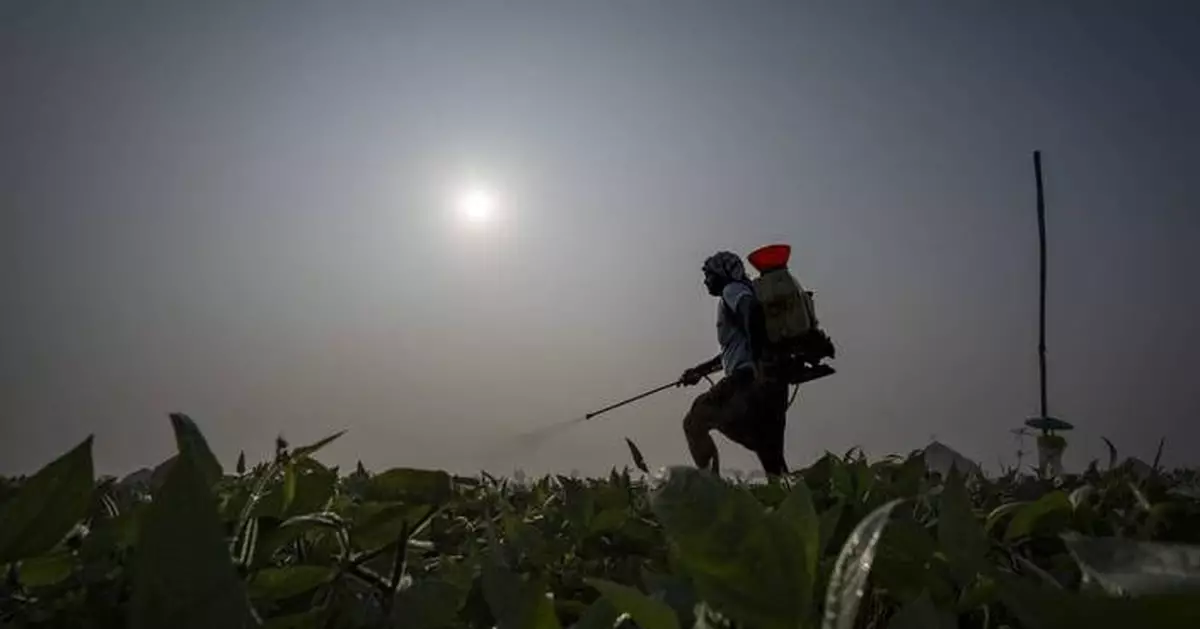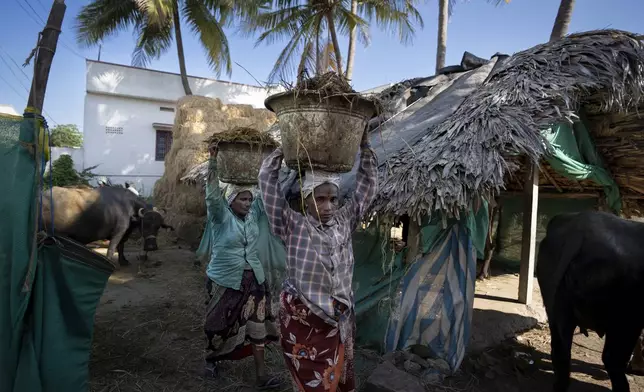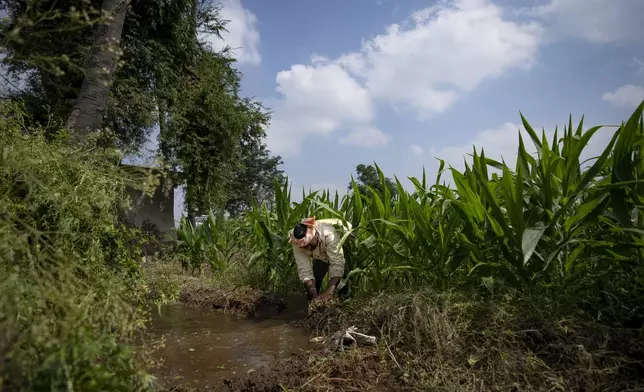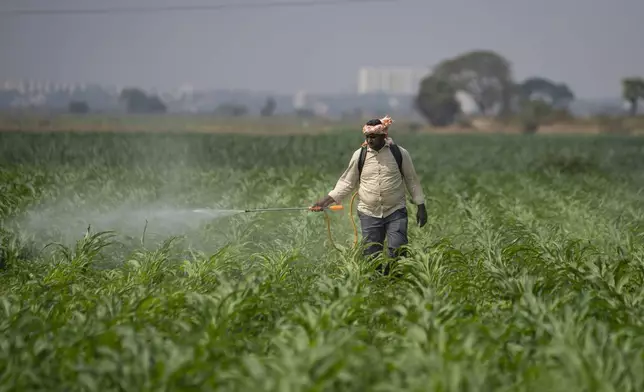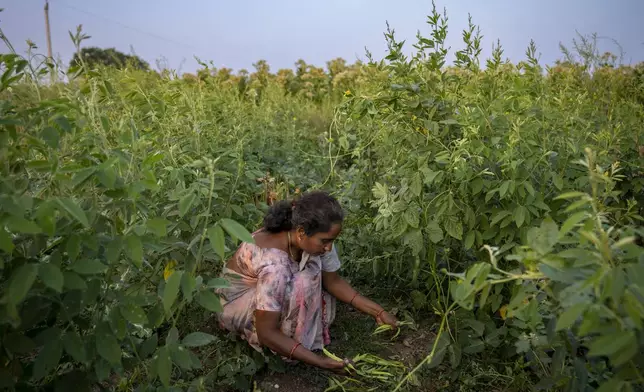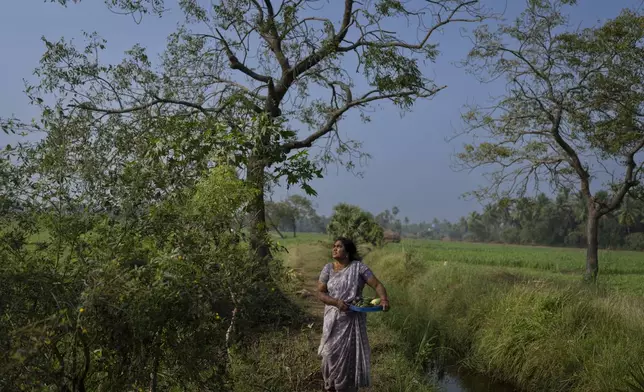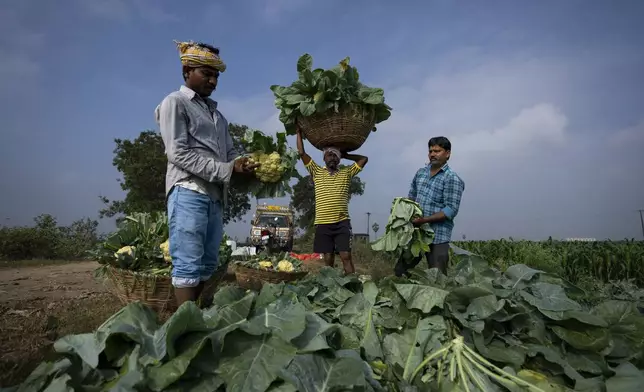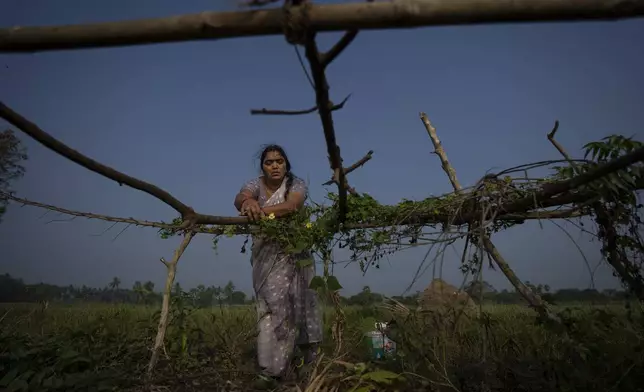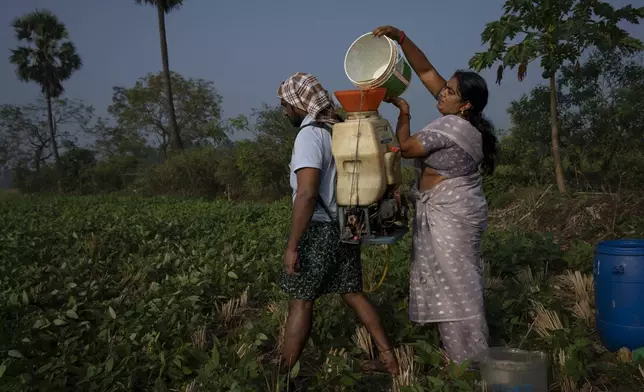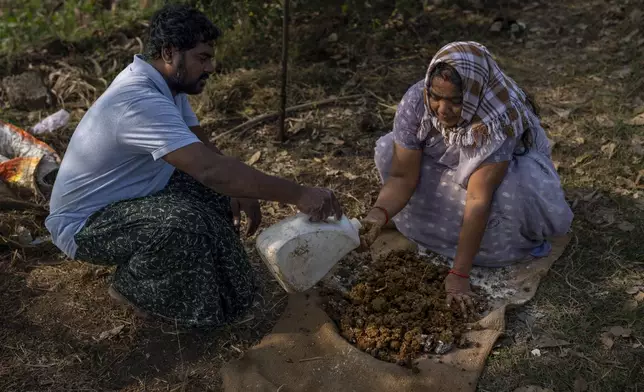GUNTUR, India (AP) — There's a pungent odor on Ratna Raju's farm that he says is protecting his crops from the unpredictable and extreme weather that's become more frequent with human-caused climate change.
The smell comes from a concoction of cow urine, an unrefined sugar known as jaggery, and other organic materials that act as fertilizers, pesticides and bad weather barriers for his corn, rice, leafy greens and other vegetables on his farm in Guntur in India's southern Andhra Pradesh state. The region is frequently hit by cyclones and extreme heat, and farmers say that so-called natural farming protects their crops because the soil can hold more water, and their more robust roots help the plants withstand strong winds.
Andhra Pradesh has become a positive example of the benefits of natural farming, and advocates say active government support is the primary driver for the state’s success. Experts say these methods should be expanded across India's vast agricultural lands as climate change and decreasing profits have led to multiple farmers' protests this year. But fledgling government support across the country for these methods means most farmers still use chemical pesticides and fertilizers, making them more vulnerable when extreme weather hits. Many farmers are calling for greater federal and state investment to help farms switch to more climate change-proof practices.
For many, the benefits of greater investment in natural farming are already obvious: In December, Cyclone Michaung, a storm moving up to 110 kilometers per hour (62 miles per hour) brought heavy rainfall across India's southeastern coast, flooding towns and fields. A preliminary assessment conducted a few weeks later found that 600,000 acres of crops were destroyed in Andhra Pradesh state.
On Raju's natural farm, however, where he was growing paddy at the time, “the rainwater on our farms seeped into the ground in one day,” he said. The soil can absorb more water because it's more porous than pesticide-laden soil which is crusty and dry. Planting different kinds of crops throughout the year — as opposed to the more standard single crop farms — also helps keep the soil healthy, he said.
But neighboring farmer Srikanth Kanapala's fields, that rely on chemical pesticides and fertilizers, were flooded for four days after the cyclone. He said seeing Raju's crops hold firm while his failed has made him curious about alternative farming methods.
“I incurred huge losses,” said Kanapala, who estimates he lost up to $600 because of the cyclone, a substantial sum for a small farmer in India. “For the next planting season, I plan to use natural farming methods too.”
Local and federal government initiatives have resulted in an estimated 700,000 farmers shifting to natural farming in the state according to Rythu Sadhikara Samstha, a government-backed not-for-profit launched in 2016 to promote natural farming. The state of Andhra Pradesh hopes to inspire all of its six million farmers to take up natural farming by the end of the decade.
The Indian federal government’s agriculture ministry has spent upwards of $8 million to promote natural farming and says farmers tilling nearly a million acres across the country have shifted to the practice. In March last year, India’s junior minister for agriculture said he hoped at least 25% of farms across India would use organic and natural farming techniques.
But farmers like Meerabi Chunduru, one of the first in the region to switch to natural farming, said more government and political support is needed. Chunduru said she switched to the practice after her husband’s health deteriorated, which she believes is because of prolonged exposure to some harmful pesticides.
While the health effects of various pesticides have not yet been studied in detail, farm workers around the world have long claimed extended exposure has caused health problems. In February, a Philadelphia jury awarded $2.25 billion in damages in a case where a weed killer with Glyphosate — restricted in India since just 2022 — was linked to a resident's blood cancer. In India, 63 farmers died in the western state of Maharashtra in 2017, believed to be linked to a pesticide containing the chemical Diafenthiuron, which is currently banned in the European Union, but not in India.
“Right now, not many politicians are talking about natural farming. There is some support but we need more,” said Chunduru. She called for more subsidies for seeds such as groundnuts, black gram, sorghum, vegetable crops and maize that can help farmers make the switch.
Farmers' rights activists said skepticism about natural farming among political leaders, government bureaucrats and scientists is still pervasive because they still trust the existing farming models that use fertilizers, insecticides and pesticides to achieve maximum productivity. In the short-term, chemical alternatives can be cheaper and more effective, but in the long term they take a toll on the soil's health, meaning larger quantities of chemicals are needed to maintain crops, causing a cycle of greater costs and poorer soil, natural farming advocates say.
“Agroecological initiatives are not getting adequate attention or budgetary outlays,” said Kavitha Kuruganti, an activist who has advocated for sustainable farming practices for nearly three decades. The Indian government spends less than three percent of its total budget on agriculture. It has earmarked nearly $20 billion in fertilizer subsidies this year, but only $55 million has been allocated by the federal government to encourage natural farming. Kuruganti said there are a handful of politicians who support the practice but scaling it up remains a challenge in India.
A lack of national standards and guidelines or a viable supply chain that farmers can sell their produce through is also keeping natural farming relatively niche, said NS Suresh, a research scientist at the Center for Study of Science, Technology and Policy, a Bengaluru-based think-tank.
But because the practice helps keep the plants and the soil healthy across various soil types and all kinds of unpredictable weather conditions, it's beneficial for farmers all around India, from its mountains to its coasts, experts say. And the practice of planting different crops year-round means farmers have produce to harvest at any given time, giving an extra boost to their soil and their wallets.
Chunduru, who's been practicing natural farming for four years now, hopes that prioritizing natural farming in the country can have benefits for producers and consumers of crops alike, and other farmers avoid the kind of harms her husband has faced.
“We can provide nutrient-rich food, soil and physical health” to future generations, she said.
Arasu reported from Bengaluru, India.
The Associated Press’ climate and environmental coverage receives financial support from multiple private foundations. AP is solely responsible for all content. Find AP’s standards for working with philanthropies, a list of supporters and funded coverage areas at AP.org.

Workers carry cattle dung, used to make natural fertilizer, in Pedavuppudu village, Guntur district of southern India's Andhra Pradesh state, Monday, Feb. 12, 2024. The area has become a positive example of the benefits of natural farming, a process of using organic matter as fertilizers and pesticides that makes crops more resilient to bad weather. (AP Photo/Altaf Qadri)

Ratna Raju, a farmer who is part of a collective that practices natural farming, works at his farm in Pedavuppudu village, Guntur district of southern India's Andhra Pradesh state, Monday, Feb. 12, 2024. The soil can absorb more water because it's more porous than pesticide-laden soil which is crusty and dry. (AP Photo/Altaf Qadri)

Ratna Raju, a farmer who is part of a collective who practice natural farming, sprays natural pesticide on his farm in Pedavuppudu village, Guntur district of southern India's Andhra Pradesh state, Monday, Feb. 12, 2024. The soil can absorb more water because it's more porous than pesticide-laden soil which is crusty and dry. (AP Photo/Altaf Qadri)
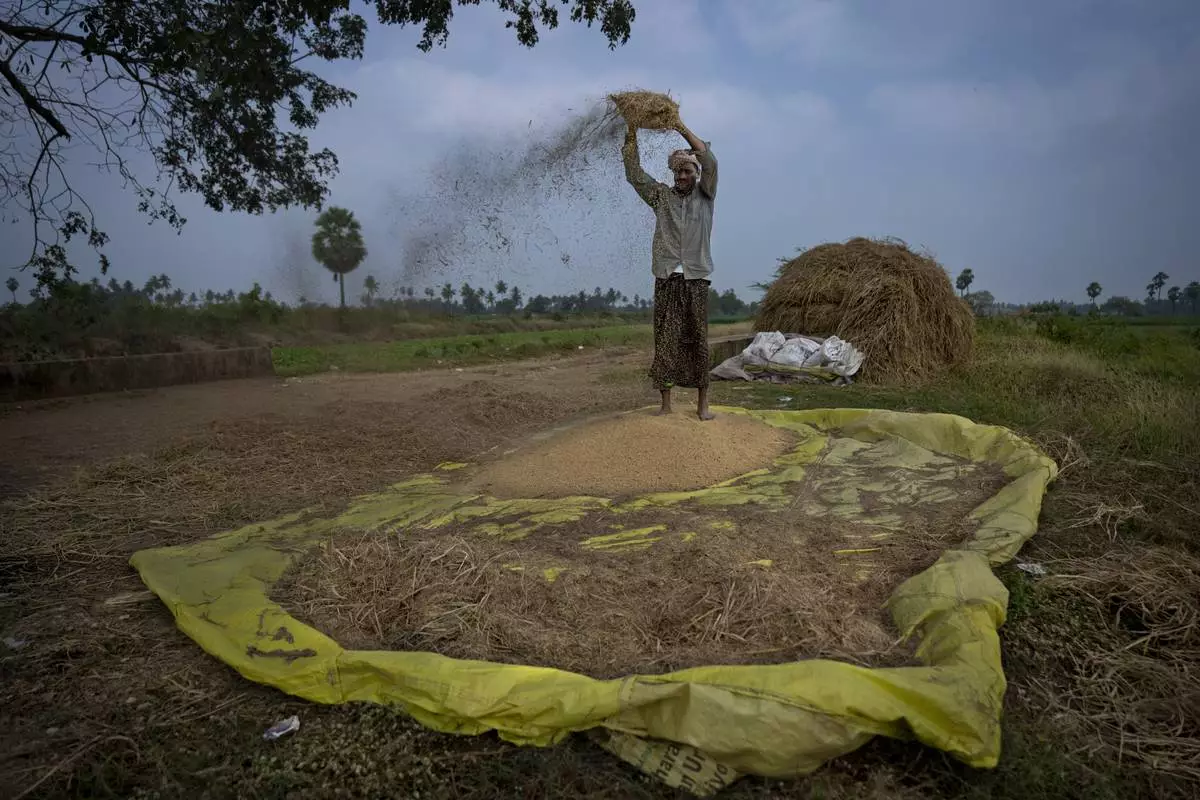
A farmer separates chaff from wheat grains in Aremanda village in Guntur district of southern India's Andhra Pradesh state, Sunday, Feb. 11, 2024. (AP Photo/Altaf Qadri)

D Rani, a natural farmer, harvests peas as she works at her farm in Pamidipadu village, Bapatla district of southern India's Andhra Pradesh state, Sunday, Feb. 11, 2024. The area has become a positive example of the benefits of natural farming, a process of using organic matter as fertilizers and pesticides that makes crops more resilient to bad weather. (AP Photo/Altaf Qadri)
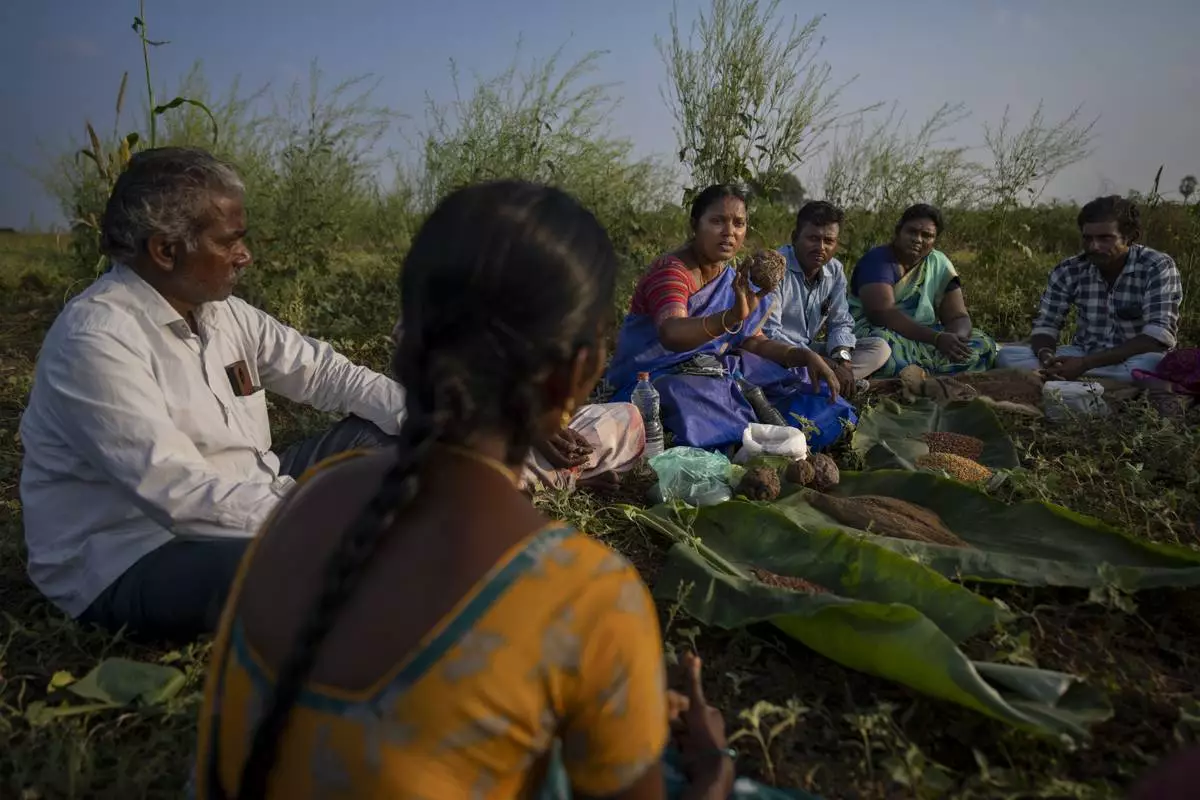
V Vanisaree, center, district project manager RySS, a regional government backed not-for-profit that promotes natural farming, explains the techniques involving natural fertilizer to members of a group in Pamidipadu village, Bapatla district of southern India's Andhra Pradesh state, Sunday, Feb. 11, 2024. (AP Photo/Altaf Qadri)
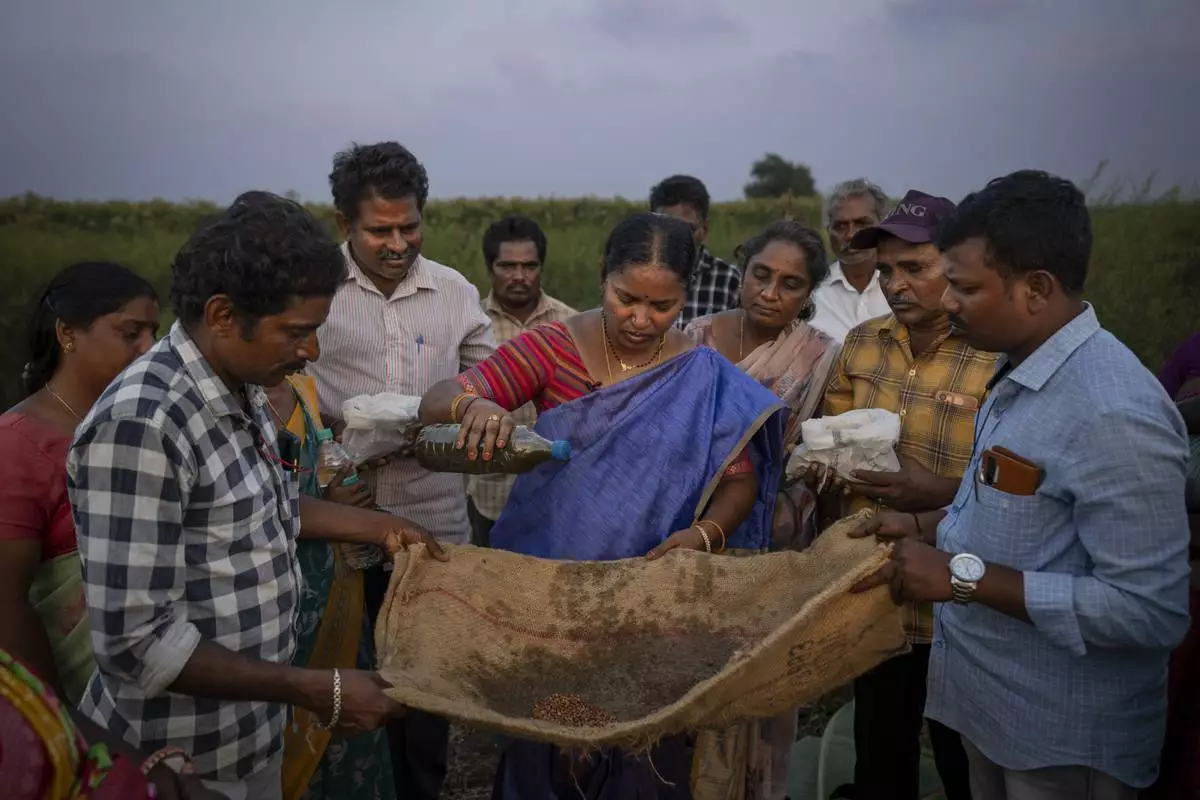
V Vanisaree, center, district project manager RySS, a regional government backed not-for-profit that promotes natural farming, demonstrates techniques of how to shield seeds with natural inoculants to the members of a group in Pamidipadu village, Bapatla district of southern India's Andhra Pradesh state, Sunday, Feb. 11, 2024. (AP Photo/Altaf Qadri)

Meerabi Chunduru, an avid practitioner and advocate of natural farming techniques, works at her farm in Aremanda village in Guntur district of southern India's Andhra Pradesh state, Sunday, Feb. 11, 2024. (AP Photo/Altaf Qadri)
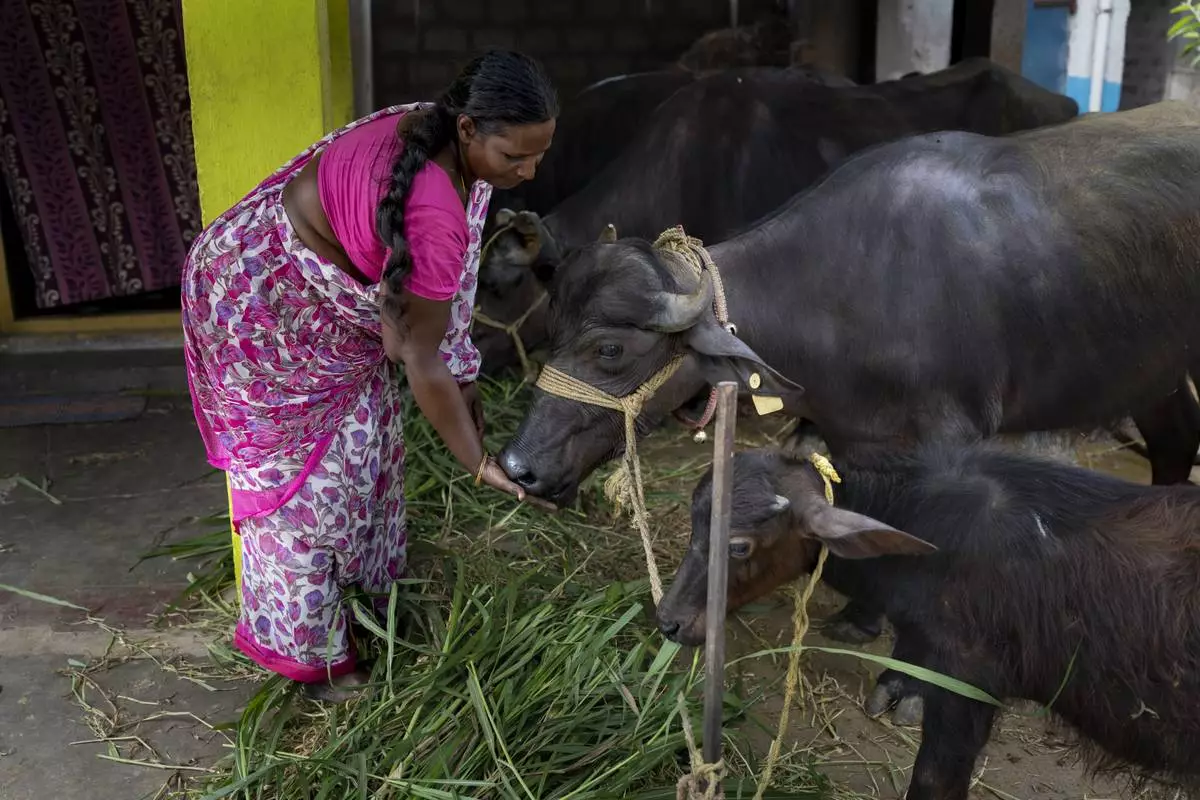
M Jojiamma, a natural farmer, feeds buffaloes at her house in Pedavuppudu village, Guntur district of southern India's Andhra Pradesh state, Monday, Feb. 12, 2024. The area has become a positive example of the benefits of natural farming, a process of using organic matter as fertilizers and pesticides that makes crops more resilient to bad weather. (AP Photo/Altaf Qadri)

Farm workers pack freshly harvested cauliflowers at a farm in Pedavuppudu village, Guntur district of southern India's Andhra Pradesh state, Monday, Feb. 12, 2024. (AP Photo/Altaf Qadri)
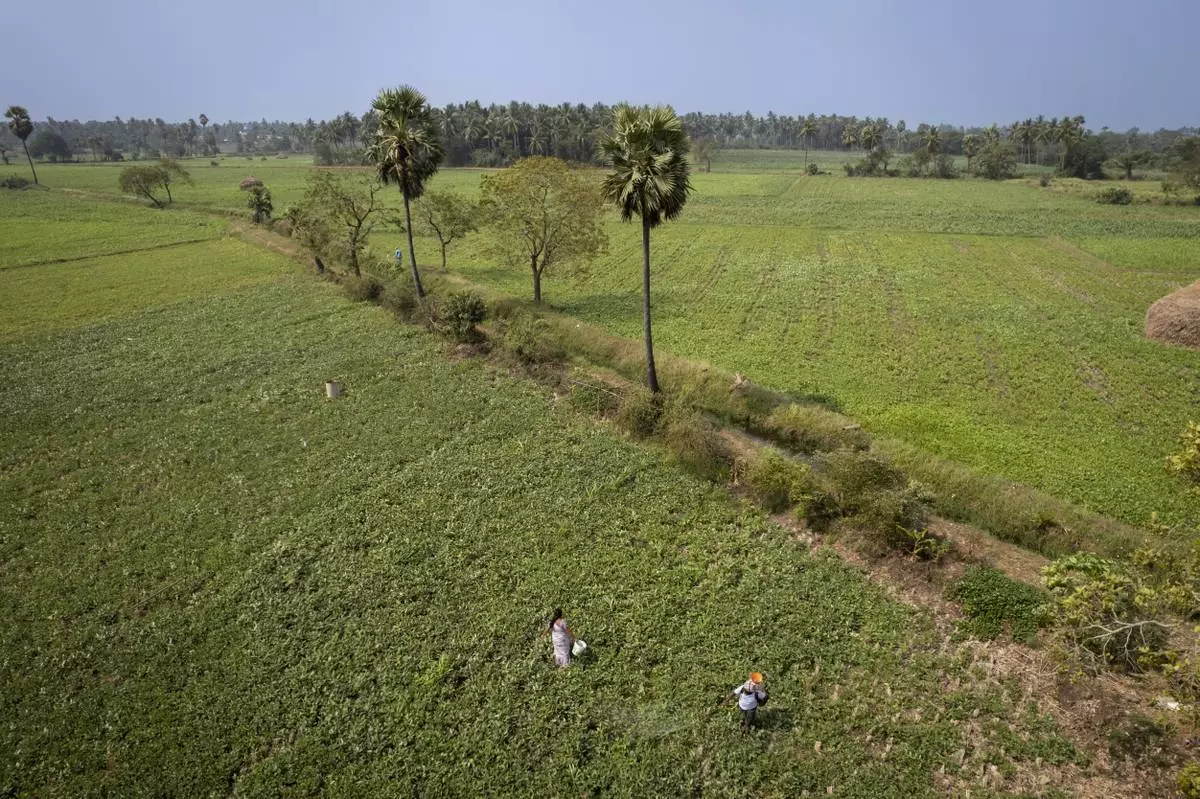
Bhaskar Rao, right, a farm worker, sprays natural pesticide as Meerabi Chunduru, left, an avid practitioner and advocate of natural farming techniques, works at her farm in Aremanda village in Guntur district of southern India's Andhra Pradesh state, Sunday, Feb. 11, 2024. The area has become a positive example of the benefits of natural farming, a process of using organic matter as fertilizers and pesticides that makes crops more resilient to bad weather. (AP Photo/Altaf Qadri)

Meerabi Chunduru an avid practitioner and advocate of natural farming techniques, works at her farm in Aremanda village in Guntur district of southern India's Andhra Pradesh state, Sunday, Feb. 11, 2024. Chunduru said she switched to the practice after her husband’s health deteriorated, which she believes is because of prolonged exposure to some harmful pesticides. (AP Photo/Altaf Qadri)

Meerabi Chunduru, an avid practitioner and advocate of natural farming techniques, pours natural pesticide into a sprayer carried by a worker at her farm in Aremanda village in Guntur district of southern India's Andhra Pradesh state, Sunday, Feb. 11, 2024. Chunduru said she switched to the practice after her husband’s health deteriorated, which she believes is because of prolonged exposure to some harmful pesticides. (AP Photo/Altaf Qadri)

Meerabi Chunduru, right, an avid practitioner and advocate of natural farming techniques, is assisted by Bhaskar Rao as they prepare 'Ghana Jeevamrtutham', a natural dry pesticide inoculant at her farm in Aremanda village in Guntur district of southern India's Andhra Pradesh state, Sunday, Feb. 11, 2024. Chunduru said she switched to the practice after her husband’s health deteriorated, which she believes is because of prolonged exposure to some harmful pesticides. (AP Photo/Altaf Qadri)
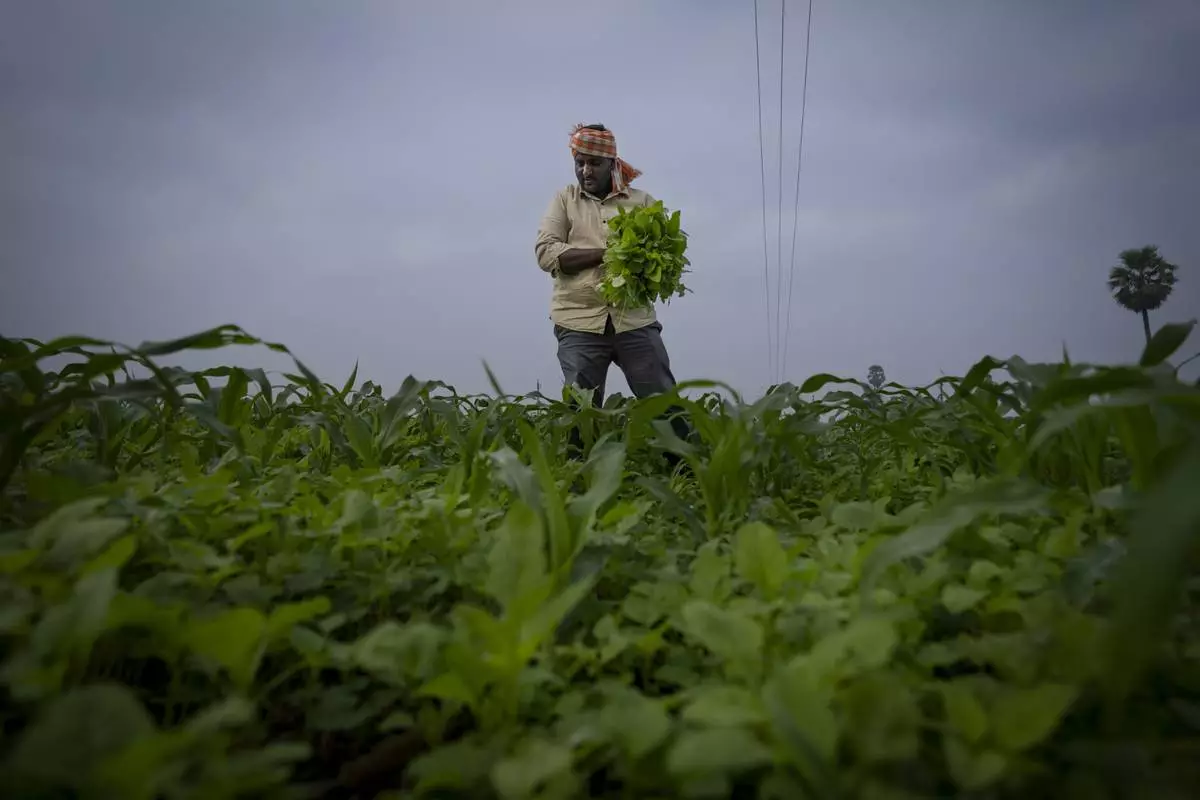
Ratna Raju a farmer who is part of a collective who practice natural farming, harvests spinach at his farm in Pedavuppudu village, Guntur district of southern India's Andhra Pradesh state, Monday, Feb. 12, 2024. The soil can absorb more water because it's more porous than pesticide-laden soil which is crusty and dry. (AP Photo/Altaf Qadri)

Bhaskar Rao, a farm worker, sprays natural pesticide at a multi-crop farm belonging to Meerabi Chunduru, an avid practitioner and advocate of natural farming techniques, in Aremanda village in Guntur district of southern India's Andhra Pradesh state, Sunday, Feb. 11, 2024. The area has become a positive example of the benefits of natural farming, a process of using organic matter as fertilizers and pesticides that makes crops more resilient to bad weather. (AP Photo/Altaf Qadri)


